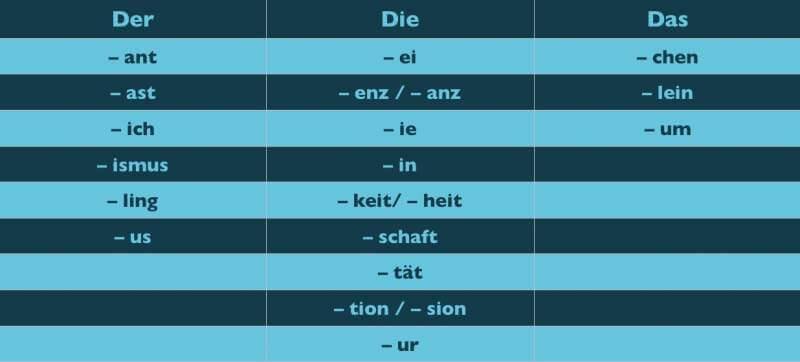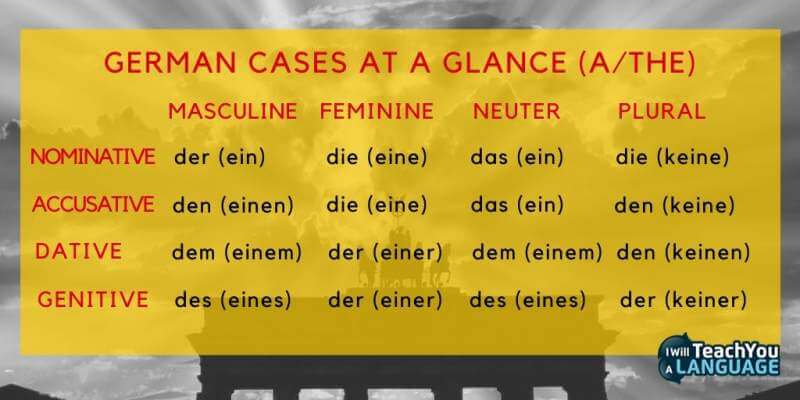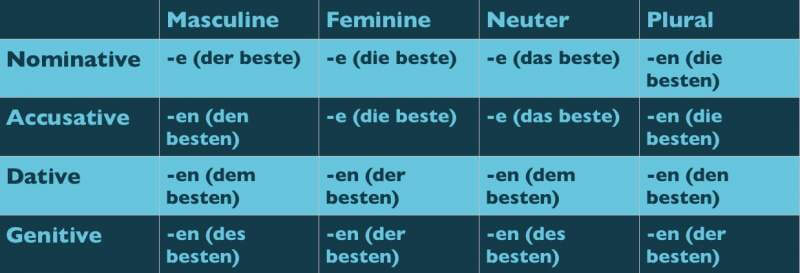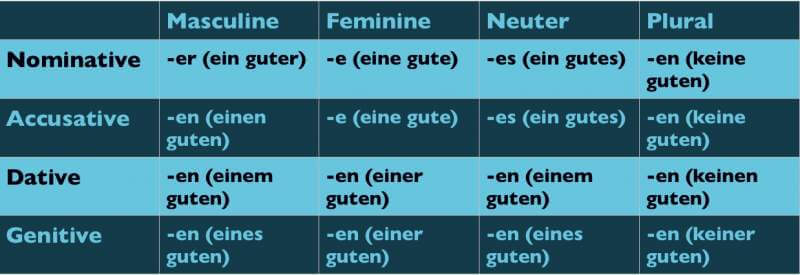
If only you could learn German by just memorising translations of words – why isn't language learning that simple?
Well, the reason is, every language uses different grammar rules to build sentences. Grammar is the framework that creates the structure of every sentence.
Essentially, grammar is a set of rules that helps you communicate accurately by composing sentences in specific ways. In this article, you'll find out the seven basic German grammar rules beginners need to know to start speaking the language right away.
German sentences appear to follow some sort of jumbled English grammar. So how do you know where to place those nouns, adverbs, adjectives, and verbs?
German grammar is actually simpler than you might imagine. (Despite what the Grammar Villain would have you believe). And by focusing your efforts on the most important rules, like the ones you'll discover in this post, you'll save time and energy. And start expressing yourself in German sooner.
Pro Tip
By the way, if you want to learn German fast and have fun while doing it, my top recommendation is German Uncovered which teaches you through StoryLearning®.
With German Uncovered you’ll use my unique StoryLearning® method to learn tricky German grammar naturally through stories. It’s as fun as it is effective.
If you’re ready to get started, click here for a 7-day FREE trial.
Table of Contents
1. German Verbs Come Second, Most Of The Time
Don't worry! Verb position is one of the most straightforward grammar concepts in German. Typically, the verb (the word relating to an action) comes in the second position of a sentence. Take a look at the following examples.
- Ich liebe dich. (I love you.)
- Wir leben dort. (We live there.)
- Er studiert Medizin. (He studies medicine.)
As you may have noticed, these sentence structures are very similar in both English and German. However, when you want to ask a question, you have to move the verb to the first position.
- Liebst du mich? (Do you love me?)
- Lebt ihr dort? (Do you (plural) live there?)
- Studiert er Medizin? (Does he study medicine?)
Double verbs, separable prefixes, German conjunctions, and German modal verbs complicate these rules slightly. However, the rules for these cases are also relatively straightforward. Learn more about verb position in German.
2. Always Capitalise German Nouns
You may have noticed that the last sentence example capitalized the word Medizin (medicine). In German, nouns (words that name people, things and places) are always capitalised. Below are more examples.
- Ich liebe den Sommer. (I love summer.)
- Wir leben in dem Haus mit meiner Mutter. (We live in the house with my mother.)
- Er studiert seit September mit seinem Bruder Medizin an der Universität. (He has been studying medicine with his brother at the university since September.)
Although all nouns are capitalized, pronouns are never capitalized, unless they come at the beginning of the sentence.
3. There's A Time, Manner, And Place For German Adverbs

Adverbs, as you probably remember from school, are words that modify verbs, adjectives and even other adverbs. In English they often (but not always) end in “ly” – “quickly”, “angrily”, “actually”.
In a sentence, adverbs tell us about how, when, how often or where something happens.
The previous example – Er studiert seit September mit seinem Bruder Medizin an der Universität – shows how the word order differs slightly in German compared to English.
In German, you always need to follow the rule “time, manner, place” when determining adverb word order.

German Adverbs Of Time
Adverbs of time let you know when something happens. Here are a few examples:
- gestern (yesterday)
- heute (today)
- immer (always)
- manchmal (sometimes)
- morgen (tomorrow)
- morgens (mornings)
- nachmittags (in the afternoon)
- nachts /abends (at night, evenings)
- nie/nimmer (never)
- oft (often)
German Adverbs Of Manner
Adverbs of manner indicate how something happens and include words such as:
- allein(e) (alone)
- eventuell (possibly)
- freiwillig (voluntarily)
- gern(e) (gladly)
- hoffentlich (hopefully)
- langsam (slowly)
- leichtsinnig (recklessly)
- lieber (rather)
- natürlich (naturally)
- sicherlich (certainly)
- vielleicht (maybe)
- widerwillig (stubbornly)
- wütend (angrily)
- zögerlich (reluctantly)
- zufällig (per chance)
- zusammen (together)
German Adverbs Of Place
Finally, adverbs of place describe where an action takes place. Some examples include:
- da/dort (here/there)
- drauβen (outside)
- drinnen (inside)
- hier (here)
- irgendwo (somewhere)
- links (left)
- nirgends (nowhere)
- oben (above)
- rechts (right)
- überall (everywhere)
- unten (below)
- voran (before/in front)
Below are some examples of how to put the “time, manner, place” rule to practice.
- Ich bin oft (time) allein (manner) irgendwo hin (place) gegangen. (I often went somewhere alone.)
- Wir sind heute (time) zusammen (manner) hier (place). (Today we're here together.)
- Er ist gestern (time) freiwillig (manner) nach drauβen (place) gegangen. (He went outside voluntarily yesterday.)
This rule doesn't exist in English. But you'll be glad it exists in German. There's no need to think about how to structure your sentences. Simply follow the rule.

4. German Nouns Have Genders
One of the more complicated grammar concepts for native English speakers to grasp is that words have genders. In German, you have three different cases to choose from: masculine, feminine, and neuter.
The case system can take time to learn but follows clear grammatical rules. Make sure you learn the gender of a word, every time you add to your German vocabulary.
- Masculine – Der
- Feminine – Die
- Neuter – Das
Sometimes, you'll have to learn which gender a word has. Other times, you can figure out the gender from the word ending.

Job positions are also distinguished by gender. Take a look at the following examples:
- Der Lehrer (male teacher)
- Die Lehrerin (female teacher)
- Der Koch (male chef)
- Die Köchin (female chef)
- Der Student (male student)
- Die Studentin (female student)
- Der Künstler (male artist)
- Die Künstlerin (female artist)
Knowing the gender of nouns is essential to formulating the rest of your German sentences. You'll also need to understand the elements of your sentence.
5. German Has 4 Cases
The articles (a/an/the in English) change depending on whether a word is the subject, direct object, indirect object, or possessive object.
- The subject – You can find the subject of a sentence by asking yourself who or what is performing an action. In German, the subject takes the nominative case.
- The direct object – A direct object is a noun or pronoun on the receiving end of the subject's action. In German, the direct object takes the accusative case.
- The indirect object – This element of the sentence is passively affected by the action of the verb. In German, the indirect object takes the dative case.
- You should also note that some German prepositions take the accusative case, while others are always in the dative case. Additionally, some prepositions can take either case, depending on their use in a sentence.

If you're already familiar with sentence structure in English, you'll find it easier to identify the subject, direct object, and indirect object of a sentence.
Let's look at an example:
- Ich (subject) habe meiner Tante (indirect object) Blumen (direct object) geschenkt. I (subject) gifted my aunt (indirect object) flowers (direct object).
The graphic below gives an overview of the German cases.

As you can see, choosing the correct translation of “the” and “a” requires some thought at first. Don't worry, even if you choose wrong, native speakers will still understand you!
The more you practice, with plenty of exposure to German through reading and listening, the less you'll have to think about which ending is right.
If you want to learn more, check out this 5 Part Guide to Finally Understanding the German Case System.

6. Noun Genders And Cases Determine Adjective Endings
As if having to choose from three different noun genders wasn't challenging enough, you also have to watch out for German adjective endings.
That's right, depending on the case, you'll have to decide which ending is appropriate for the preceding adjective. The good news is, there are straightforward rules to help you determine which adjective ending to use.
Let's take a look at the range of possibilities.
German Definite Article Adjective Endings “The”

German Indefinite Article Adjective Endings “A”

Both the gender of the word and its role in the sentence determine which case and endings to use. It sounds scary but it will become second nature, especially if you look out for these changes as you read and listen to German.
7. German Plural Possibilities
Unlike English, you can't always just slap an -s onto a word to create the plural form in German. The German language forms plurals in multiple ways. Some common plural endings are -e, -er, -en, -n, and -s.
Below are a few examples.
Add an -e ending to nouns ending in -eur, -ich, -ier, -ig, -ling, and -ör. Many feminine words that are single-syllable also add an -e, as well as an umlaut.
- Das Tier (the animal) – die Tiere (the animals)
- Der Likör (the liqueur) – die Liköre (the liqueurs)
- Die Hand (the hand) – die Hände (the hands)
Add -er to most single-syllable neuter nouns. An umlaut may also be necessary.
- Das Wort (the word) – die Wörter (the words)
- Der Mann (the man) – die Männer (the men)
- Das Haus (the house) – die Häuser (the houses)
Add an -n or -en ending to masculine words ending in -e, -ent, and, -ant, -ist, -or. Feminine words ending in -e, -in, -ion, -ik, -heit, -keit, -schaft, -tät, and -ung also often take this ending.
- Der Autor (the author) – die Autoren (the authors)
- Die Blume (the flower) – die Blumen (the flowers)
Add an -s ending to words finishing with -a, -i, -o, -u, and -y.
- Das Auto (the car) – die Autos (the cars)
- Das Kino (the cinema) – die Kinos (the cinemas)
- Die Mutti (the mother) – die Muttis (the mother)
As in English, some German nouns are the same in both their singular and plural forms. In this case, only the word's article reveals which form is intended.
For example, der Löffel (the spoon) becomes die Löffel (the spoons). There are also several exceptions to the above rules that you'll have to become familiar with through immersion in German.

FAQs About Basic German Grammar
Which German grammar rules are the most important ones to learn?
Below are the most important German grammar rules to learn in the order that you should learn them.
1. Nouns have genders – German nouns have one of three genders: masculine, feminine, and neuter. You have to learn them by heart as you study German vocabulary.
2. Word order and sentence structure – For example, the verb always comes second or last.
3. Verb conjugation – Conjugate regular German verbs in the present tense before moving on the past and future tenses or irregular verbs.
4. Conjunctions – Words like und (and) and aber (but) combine clauses to make longer sentences.
5. The four German cases – The nominative, accusative, dative, and genitive are the four German cases.
6. Adjective endings – Adjective endings differ depending on the case of the noun they modify and whether you’re using definite or indefinite articles.
7. Prepositions – German has accusative and dative prepositions, as well as changing prepositions.
These are some of the basic German grammar topics that have a significant impact on your fluency. Of course, there are many more German grammar rules to learn.
What are the basic rules of German grammar?
Some of the basics of German grammar are similar to the English language.
For example, German uses the same Subject-Verb-Object (SVO) word order as English. That’s why simple German sentences look so much like their English equivalents. For example, “I read a book” is Ich lese ein Buch.
Simple verb conjugation is one of the key German grammar rules. Verb stems take various endings, depending on the person pronoun you’re using and whether a verb is regular or irregular.
For example, the verb kochen (to cook) is conjugated as follows: ich koche (I cook), du kochst (you cook), er kocht (he cooks).
You conjugate regular verbs according to the standard conjugation patterns, while irregular verbs can change their vowels or undergo other unique changes.
Another basic rule of German grammar is that nouns have genders. In English, nouns don’t have genders, so this grammar rule can take time to get used to. Try to learn the genders of German nouns along with their definitions.
The definite articles, “the,” in German are “der” (masculine), “die” (feminine), and “das” (neuter). Many beginning learners ignore the noun genders, only to face difficulties with the grammar later as a result.
What is the most effective way to learn German grammar?
The most effective way to master German grammar is to start with the fundamentals like noun genders, basic word order, and the nominative case.
Once you understand the basics, you can advance to the accusative case, conjunctions, and personal pronouns.
Avoid tackling topics that are too advanced for your level, as there may be other topics you need to learn first to understand them.
Immersing yourself in the German language from the beginning is another way to learn grammar more effectively. Read German books and short stories, listen to podcasts in German, watch German TV shows, and seek out a tandem language partner to speak with.
Practice writing German sentences and repeat them aloud to improve your speaking skills at the same time.
What are helpful resources for practicing German grammar?
These resources will come in helpful while you’re practicing basic German grammar:
1. German.net – Download German grammar exercises for beginners.
2. Deutsch Akademie – Choose from over 50,000 exercises to practice German grammar.
3. Dartmouth College – Review key German grammar topics.
4. German Courses Vienna – Free online exercises for levels A1 to B2.
5. Sprachschule Aktiv – Free German grammar exercises for levels A1 to C2.
6. Mein Deutschbuch – Online German grammar exercises organized by topic and niveau.
7. Übungskönig – Practice German grammar for the test DaF “Deutsch als Fremdsprache” (German as a foreign language exam).
8. GermanExercises.de – Select various German grammar topics to learn and practice at the same time.
Start Communicating With Basic German Grammar

Although German sentence structure may not seem to make sense, at first sight, there are specific rules behind the apparent chaos.
Fortunately for you, many aspects of basic German grammar follow straightforward rules and have few exceptions.
However, many of these rules take time to learn. The good news is that as you listen to German podcasts and read German books, these rules will become second nature to you. But you will need to immerse yourself in the language for this.
The seven essential grammar rules above will help you dive right into German as a beginner. And get you started so you can connect with native speakers.
Even if you haven't mastered basic German grammar, continue to practice the language. German speakers will still understand you if you make mistakes. And will applaud your effort to learn their language!
Learn German Through Story

Now that you know some basic German grammar, you might be even more excited to learn the language. But you're probably still wondering how you can make the essential grammar second nature, so you can use it effortlessly in conversation.
Well, in German Uncovered, my story-based beginner course, all the learning happens in the context of a page-turning tale. You learn the key vocabulary and grammar of German as you read the story, with guidance from an expert German teacher.
Thanks to the compelling content, you learn and retain the language better than in traditional methods where you learn grammar or vocabulary in isolation, without a rich context to make the meaning clear.
So if you're a German beginner who'd like to reach intermediate level without wrestling with tricky German grammar points, make sure you check out German Uncovered.
With this course, you learn to speak German through a fun and natural method that makes learning a pleasure, and grammar a breeze! And who doesn't want that!?


Olly Richards
Creator of the StoryLearning® Method
Olly Richards is a renowned polyglot and language learning expert with over 15 years of experience teaching millions through his innovative StoryLearning® method. He is the creator of StoryLearning, one of the world's largest language learning blogs with 500,000+ monthly readers.
Olly has authored 30+ language learning books and courses, including the bestselling "Short Stories" series published by Teach Yourself.
When not developing new teaching methods, Richards practices what he preaches—he speaks 8 languages fluently and continues learning new ones through his own methodology.









































